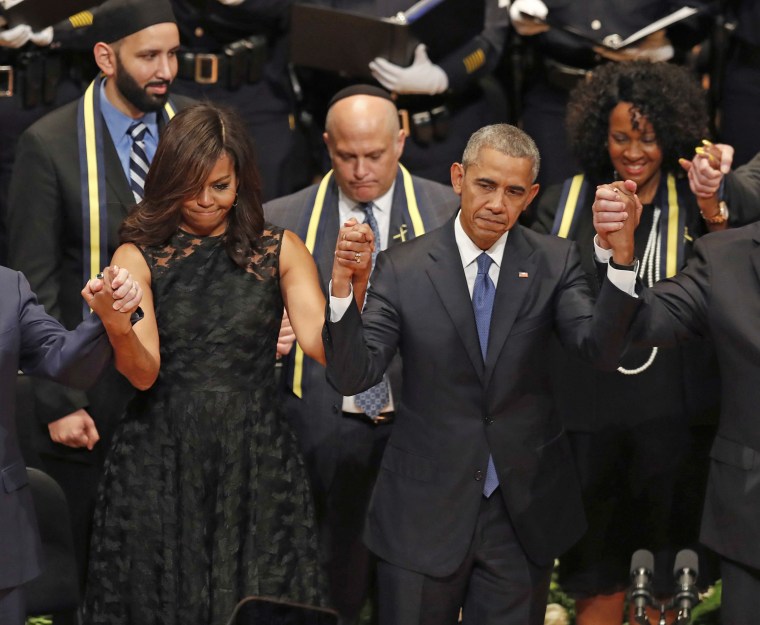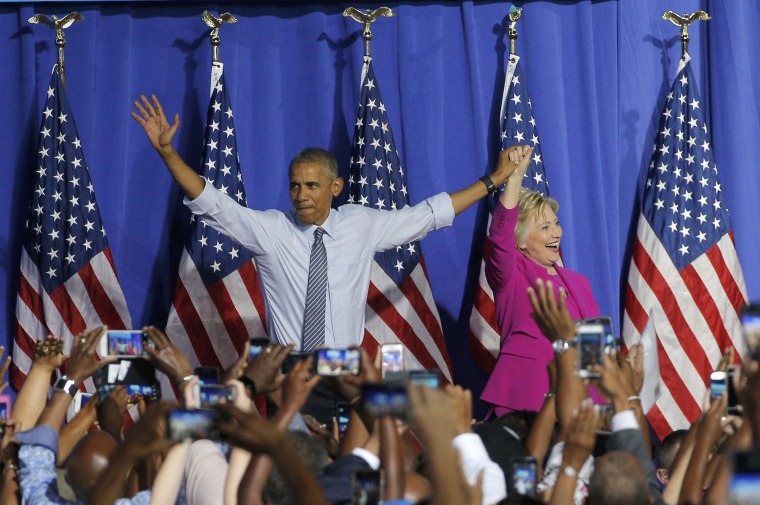When President Barack Obama delivers his speech Wednesday at the Democratic National Convention in Philadelphia, he will be passing the leadership torch of the party on to Hillary Clinton.
It's also the beginning of a longer goodbye following a meteoric political rise.
Twelve years ago, the then-virtually unknown senator from Illinois gave a speech at the Democratic National Convention so impressive to party faithful that it catapulted him to the Democratic nomination four years later and then two terms as the nation’s first black president.
In that short time, Obama has led a reshaping of his party, leaving it more progressive and multi-cultural than ever — but also very weak in rural areas and the South.
"Obama obviously accelerated the change in the image of the party, from the party of FDR, JFK, LBJ, and Bill Clinton, as being the party of the white working class and white intellectuals,” said Michael Kazin, a Georgetown University professor who wrote "American Dreamers: How the Left Changed a Nation," published in 2011.
"Most Democratic voters are still white, but Trump’s rise underlines how much the Democrats are perceived as the party that is the natural home of African-Americans and Latinos," Kazin added.
In 2004, the future president presented his dream for the future in his DNC speech, an America that would not be divided by party, race or religion. He campaigned on those ideas four years later.
Obama accepted the Democratic presidential nomination in 2008 in Denver, Colorado, a state that had voted for Republicans in the previous three elections. Back then, California had a Republican governor, and Minnesota a GOP senator.
Related: Sanders Says He Favored Clinton Pick More Progressive VP
The Democratic Party that Obama was taking the helm of had two U.S. senators in Arkansas and West Virginia and controlled the governor’s office in Kentucky. A few days earlier, he had chosen Joe Biden as his vice-presidential candidate, among a group of finalists that was dominated by white men; Indiana’s Evan Bayh and Virginia’s Tim Kaine were the other leading contenders.
Eight years later, Obama’s party is much more liberal on policy than the one he inherited, as was illustrated over the last few weeks when the Democrats adopted a party platform that calls for: free community college, a $15 minimum wage, the abolition of the death penalty, providing a Medicare-like option for health insurance, and 12 weeks of paid leave for new parents.
Nearly all of those ideas are building on Obama administration initiatives.
In shifts that have largely taken place since Obama’s election in 2008 and with his backing, Democrats now strongly favor gay marriage, legal protections for people who are transgender, the Black Lives Matter/criminal-justice-reform movement, citizenship rights for undocumented immigrants and the idea that Islam is a religion that should be considered part of the American fabric as Christianity and Judaism are.
"There is far more boldness on the part of Democrats to embrace minority rights," said E.J. Dionne, a senior fellow at the Brookings Institution.
That emphasis on minority rights came as the Democratic Party has become more reliant on the votes of people of color and progressive whites in the Obama era. Meanwhile, the moderate, Southern wing of the party that Bill Clinton led has waned in number and influence.
According to a recent analysis by the Atlantic, in 1992, about 76 percent of Democratic-leaning voters were white, compared to about 55 percent now.
In part, that change in the party's coalition was the result of two political trends that preceded Obama but accelerated during his presidency: the South becoming a much more Republican region and the growing ethnic diversity of the nation, particularly the increase in the Latino population.
Obama, after getting prominent Republicans to back him and winning traditionally conservative states like Indiana in 2008, tried in his first term to keep a broad coalition that included his base but also more moderate and GOP-leaning voters.
Obama spent much of 2009 and 2010 trying to court Republicans on Capitol Hill and get them to support his proposals to stimulate the economy and expand access to health care, annoying liberals along the way.
Looking to woo white swing voters, he spoke both carefully and rarely about racial issues in his first term and announced his support for gay marriage only after Biden did the same. The president still has not said he formally opposes capital punishment.
But by 2012, Obama largely abandoned any pretense of winning over conservative-leaning voters. His reelection team had an initiative called Operation Vote that focused on increasing turnout among eight key voting blocs: African-Americans, Asian-Americans, gays, Jews, Latinos, seniors, women and young people. A few months before the election, Obama announced a policy that would halt deportations for young people whose parents brought them to the United States illegally — the so-called Dreamers — an obvious appeal to the Latino vote.
Related: Obama: Trump's NATO Comments Show 'Lack of Preparedness'
Hillary Clinton is now borrowing Obama’s playbook, with a presidential campaign very focused on using social media and demographic data to find and turn out young people, minorities and women.
"Obama's campaigns were able to accelerate trends in electioneering already underway," said Sasha Issenberg, whose 2012 book "Victory Lab" chronicled some of these tactics.
"Hillary Clinton's mobilization-centric path to victory looks a lot more like Obama's than her husband's, where the focus was much more on swing voters than non-voters, in part because the country has changed and in part because campaigns have changed," Issenberg said.
At the end of Obama's tenure, Democrats are dominant in states like Oregon and California, where the party controls almost every major office. The party is strong, particularly in presidential elections, in Colorado, Virginia and North Carolina, states George W. Bush carried in 2004.
"The Obama coalition didn't just happen because the demography was going in that direction," said David Simas, a top aide in Obama's 2012 campaign who now runs the White House's office of political strategy and outreach. "Plouffe and then Messina [David Plouffe ran Obama's 2008 campaign, Jim Messina the 2012 operation] in the two campaigns, basically were very, very deliberate in saying there is a different way to get to 270."
He added, "With Hispanic and African-American voters, for example, it wasn't a matter of building a program 2-3 months out to basically drive the vote. It was a year to year and half process."
At the same time, the Democratic Party under Obama struggles to build close ties with the police, the armed forces, older white men and white evangelical Christians. The party is at perhaps its weakest point ever in states like Alabama, Kentucky and West Virginia.
In Floyd County in Eastern Kentucky, John Kerry won 62 percent of the vote in 2004. In 2012, Obama won 32 percent there.
In the South, Democratic candidates for governor and the U.S. Senate struggle to distance themselves from a president that even many Democrats in their states don’t like.
In 22 states, most in the South and West, Republicans control both chambers of the statehouse and the governor’s office, compared to just 7 where Democrats have full control.
Hillary Clinton, aware of her party's weakness in the South, is making virtually no attempt to win in Arkansas — a state where she was the first lady for more than a decade.
"Love him or hate him, he [Obama] has all but wiped out the bench in Middle America and the South of the Democratic Party. That’s just a fact," former Kentucky state auditor Adam Edelen told Insider Louisville after the 2015 election, when Edelen lost his reelection bid.
Obama's influence should not be overstated. During his 2008 campaign, Obama said, "I think Ronald Reagan changed the trajectory of America in a way that, you know, Richard Nixon did not and in a way that Bill Clinton did not."
Reagan was the key figure in the Republican Party becoming what it remains today, with its emphasis on small government, a strong national defense and traditional social values. It is not clear Obama will set his party's policy course for three decades, as Reagan did.

On foreign policy, Hillary Clinton has suggested that she believes Obama has over-corrected in his attempts to avoid repeating the mistakes of George W. Bush's administration, particularly the Iraq War. Obama has withdrawn most troops from Iraq and Afghanistan, refused to deploy a large number of forces to fight ISIS or resolve the Syrian civil war, argued that both parties are too focused on terrorism as a national security problem and suggested that the U.S. must recognize that it can't solve all of the world's problems.
Clinton, if elected, may break from Obama's approach and be more willing to deploy U.S forces and keep a substantial American presence troop presence in the Middle East to prevent groups like ISIS from emerging.
On economic issues, Bernie Sanders and Elizabeth Warren have created a coalition to the left of Obama that is pushing for populist policies, like trying to reduce the size of big banks, that the president has not favored.
During his tenure, Obama tried to meld the more centrist, pro-big business policies of Bill Clinton's administration with the desires of the party's more liberal wing. Many Democrats now view this strategy a mistake, arguing that Obama should have spent his first two years in office pushing for a bolder and more expansive health care plan than the Affordable Care Act and stronger limits on Wall Street than the Dodd-Frank law.
"There has certainly been a rise in the populist, progressive wing in the party. Those wings are farther to the left ideologically than Obama," said Andra Gillespie, a political science professor at Emory University.
But Democrats say they believe Obama will have a permanent legacy on the party.
By running and then winning, as a black candidate, appointing people with diverse backgrounds to a number a key posts — from attorney general to the U.S. Supreme Court — and then laying the groundwork for the party’s first female nominee, Obama has made inclusion a hallmark of Democrats.
Over the last few months, Hillary Clinton's aides made sure to put out a list of potential running mates that included several candidates who were not white men, aware that party activists expected her to consider diversity in the vice-presidential choice. (Of course, she did eventually choose a white man, but he is fluent in Spanish.)
And she has pledged to appoint women to at least half of the posts in her cabinet if she is elected president.
"He opened the door to the question of race. He forced the question, he started the conversation,” said Michele Jawando, who is a vice president at the Center for American Progress, a liberal think tank. “If you are a Barack Obama and you have Eric Holder and Lisa Jackson and Ken Salazar in your cabinet and they are now standard-bearers, having Loretta Lynch there, who we have representing the Democratic Party is different. Sonia Sotomayor will be the liberal standard-bearer [on the Supreme Court] after Justice Ginsburg leaves."
